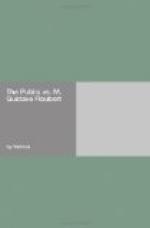“One day, when at the height of her illness, she had thought herself dying, and had asked for the communion; and while they were making the preparations in her room for the sacrament, while they were turning the night-table, covered with sirups, into an altar, and while Felicite was strewing dahlia flowers on the floor, Emma felt some power passing over her that freed her from her pains, from all perception, from all feeling. Her body, relieved, no longer thought; another life was beginning; it seemed to her that her being, mounting toward God, would be annihilated in that love like a burning insense that melts into vapour. [You see that this is the language in which M. Flaubert speaks of religious things]. The bed-clothes were sprinkled with holy water, the priest drew from the holy pyx the white wafer; and it was fainting with a celestial joy that she put out her lips to accept the body of the Saviour presented to her.”
I ask the pardon of the Government Attorney, I ask the Court’s pardon for interrupting this passage; but I must needs say that it is the author who is speaking, and bring to your notice in what terms he expresses the mystery of the communion. Before going on with the reading, I must needs impress the literary value of this picture upon the Court and insist that they seize upon these expressions which are the author’s own:
“The curtains of the alcove floated gently round her like clouds, and the rays of the two tapers burning on the night-table seemed to shine like dazzling halos. Then she let her head fall back, fancying she heard in space the music of seraphic harps, and perceived in an azure sky, on a golden throne in the midst of saints holding green palms, God the Father, resplendent with majesty, who with a sign sent to earth angels with wings of fire to carry her away in their arms.”
* * * * *
“This splendid vision dwelt in her memory as the most beautiful thing that it was possible to dream, so that now she strove to recall her sensation, that still lasted, however, but in a less exclusive fashion and with a deeper sweetness. Her soul, tortured by pride, at length found rest in Christian humility, and, tasting the joy of weakness, she saw within herself the destruction of her will, that must have left a wide entrance for the inroads of heavenly grace. There existed, then, in the place of happiness, still greater joys,—another love beyond all loves, without pause and without end, one that would grow eternally! She saw amid the illusions of her hope a state of purity floating above the earth mingling with heaven, to which she aspired. She wanted to become a saint. She bought chaplets and wore amulets; she wished to have in her room, by the side of her bed, a reliquary set in emeralds that she might kiss it every evening.”
Here are some of his religious sentiments! And if you wish to pause a moment to consider the author’s thought, I will ask you to turn the page and read the first three lines of the second paragraph:




